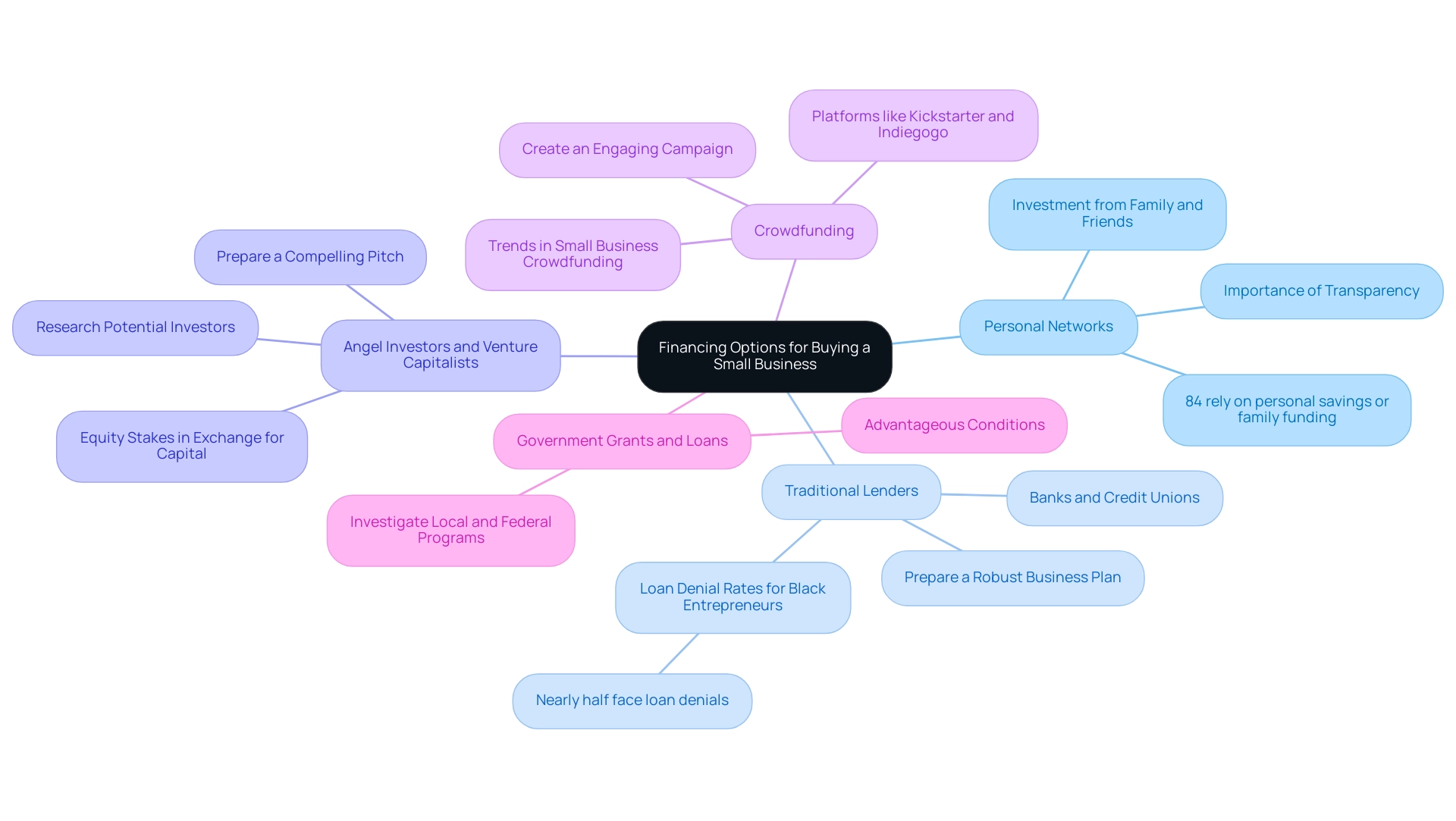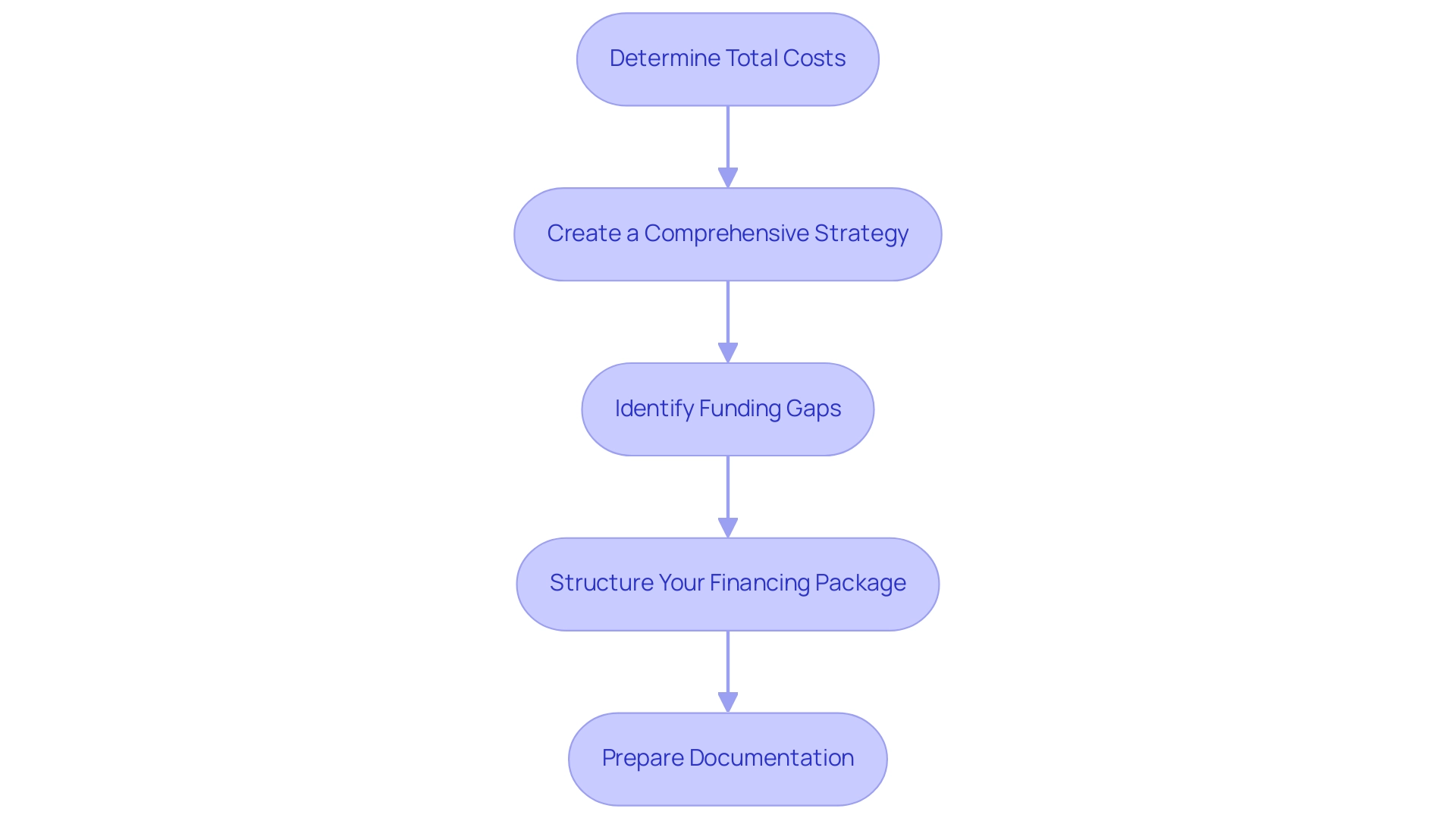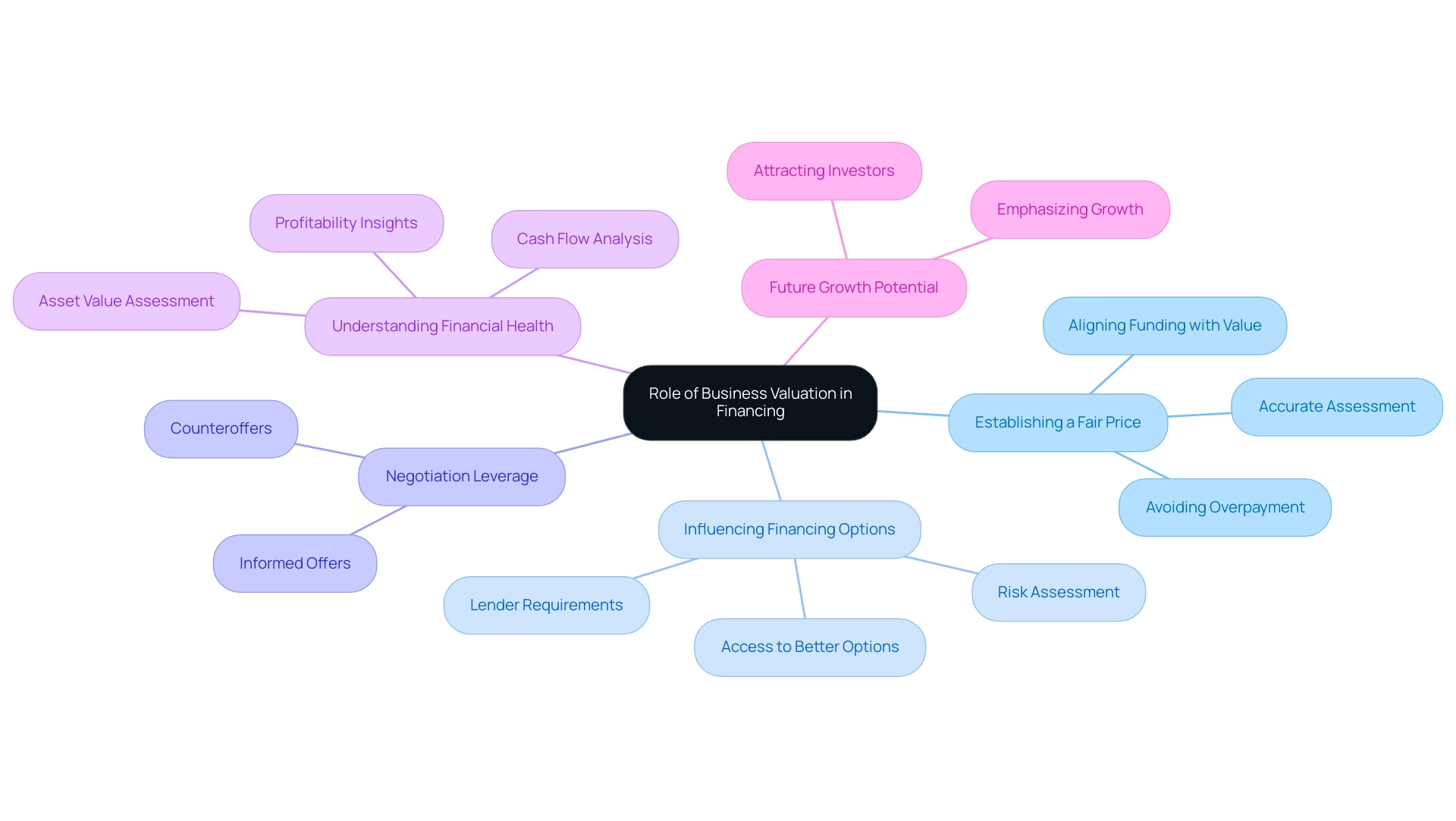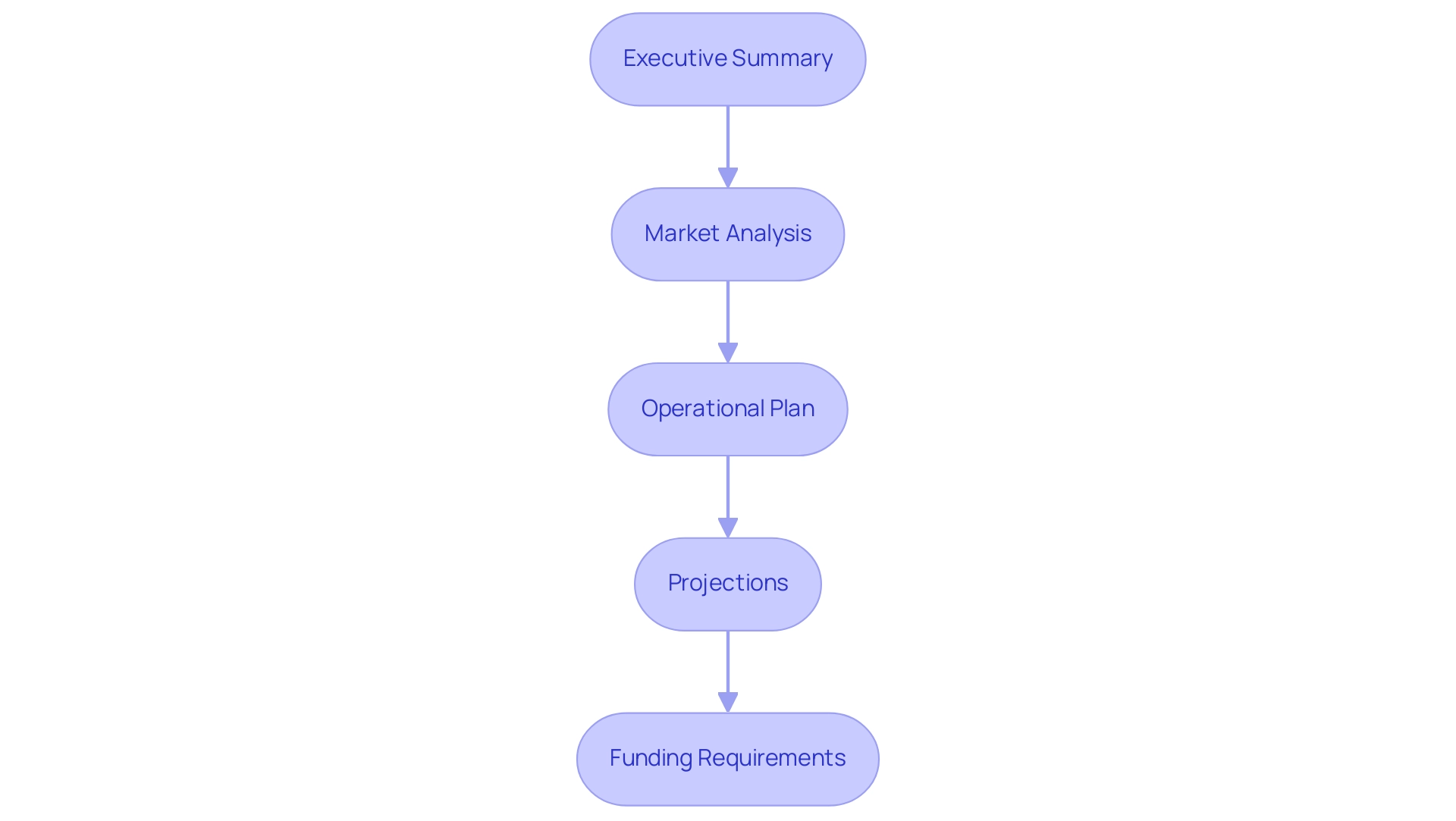Introduction
Navigating the complex world of financing a small business acquisition can be daunting, yet understanding the various funding sources available can make all the difference. From leveraging personal networks to exploring traditional lenders, aspiring business owners have a wealth of options at their disposal. Each avenue presents unique advantages and challenges, making it essential to assess financial needs carefully and construct a compelling financing package.
Moreover, a solid grasp of business valuation can empower buyers to negotiate effectively and secure favorable terms. This article delves into the intricacies of financing options, offering practical insights and strategies to enhance the likelihood of a successful business purchase.
Exploring Financing Options: From Personal Networks to Traditional Lenders
When contemplating how to finance buying a small business, it’s essential to explore a variety of funding sources to maximize your chances of securing the necessary capital. Here’s a comprehensive guide to potential options:
-
Personal Networks: Tap into your personal connections—family, friends, or colleagues—who may be interested in investing in your venture.
Transparency is essential; clearly communicate your plans and outline how their investment could yield benefits. Notably, statistics reveal that nearly 84% of ventures initiated by people of color rely on personal savings or family funding, which illustrates how to finance buying a small business through these connections.
-
Traditional Lenders: Banks and credit unions remain reliable options for obtaining loans for enterprises.
To enhance your appeal, prepare a robust plan that details your vision, projected revenue, and a solid repayment strategy. This preparation can significantly improve your chances of securing funding. However, it is important to note that nearly half of black entrepreneurs who apply for loans are denied, highlighting the challenges many face in accessing financing.
-
Angel Investors and Venture Capitalists: These are crucial when considering how to finance buying a small business, as they provide capital in exchange for equity stakes.
Conduct thorough research to identify potential investors who specialize in your industry and prepare a compelling pitch that highlights the unique aspects of your business.
-
Crowdfunding: Utilizing platforms like Kickstarter or Indiegogo can be an effective way to raise funds.
Create an engaging campaign that not only explains your concept but also conveys its significance to potential backers. Recent trends indicate that small enterprises increasingly utilize crowdfunding, showcasing successful campaigns that highlight how to finance buying a small business through innovative methods.
-
Government Grants and Loans: Take time to investigate local and federal programs that support small enterprise acquisitions.
These programs frequently provide advantageous conditions that can alleviate your monetary strain.
In 2024, statistics show that a considerable proportion of small enterprises are financed through personal networks, illustrating how to finance buying a small business by emphasizing the significance of these connections. Furthermore, comprehending the nine health ratios that offer insights into liquidity, profitability, efficiency, and leverage can deepen your grasp of the economic landscape. By diversifying your funding sources, you not only enhance your chances of obtaining the necessary resources but also equip yourself with a wider comprehension of the economic landscape.
Remember, the journey to ownership is as much about building relationships as it is about securing capital.

Assessing Your Financial Needs and Structuring a Financing Package
To effectively evaluate your monetary needs and structure a financing package, follow these steps:
- Determine Total Costs: Calculate the total cost of purchasing the business, including purchase price, legal fees, due diligence costs, and any necessary renovations or equipment purchases.
- Create a Comprehensive Strategy: Formulate a detailed strategy that outlines your funding needs and how you intend to allocate the resources. Include operating expenses for the first few months to ensure a smooth transition.
- Identify Funding Gaps: Compare your available resources with the total costs to identify any funding gaps. This will assist you in comprehending how much extra funding you require.
- Structure Your Financing Package: Decide on the mix of debt and equity you will use. Consider how much you can afford to borrow versus how much you want to give away in equity. A balanced approach often works best.
- Prepare Documentation: Collect essential paperwork, such as your operational plan, financial records, and personal monetary details, to present to potential lenders or investors.
By thoroughly evaluating your monetary requirements and creating a well-organized funding package, you will learn how to finance buying a small business successfully.

Understanding the Role of Business Valuation in Financing
Comprehending company valuation is essential when considering how to finance buying a small business. Here’s how it plays a role:
-
Establishing a Fair Price: An accurate assessment assists you in determining a just price for the enterprise, ensuring you don’t overpay and that the funding aligns with the true value of the venture.
-
Influencing Financing Options: Lenders often require a valuation of the enterprise to assess risk. A well-regarded enterprise can open doors to better financing options.
-
Negotiation Leverage: Understanding the worth of the enterprise gives you leverage in negotiations, allowing you to make informed offers and counteroffers.
-
Understanding Financial Health: A valuation offers insights into the company’s financial health, including profitability, cash flow, and asset value, which are critical for assessing the viability of the investment.
-
Future Growth Potential: Valuation can also emphasize growth potential, which is crucial for lenders and investors seeking a return on their investment.
By understanding the role of valuation, you can improve your funding strategy and make informed choices about how to finance buying a small business throughout the acquisition process.

Creating a Solid Business Plan to Support Financing Requests
To create a solid plan that supports your financing requests, follow these guidelines:
- Executive Summary: Start with a concise executive summary that outlines your concept, mission, and vision.
- Market Analysis: Conduct thorough market research to understand your target audience, competition, and industry trends.
- Operational Plan: Detail how the business will operate, including organizational structure, staffing, and logistics.
- Projections: Include realistic economic forecasts that showcase expected revenue, expenses, and profitability over the next few years.
- Funding Requirements: Clearly specify the amount of funding you require and how you intend to utilize it, demonstrating a careful approach to resource management.
By presenting a well-structured business plan and including supporting documents such as resumes, legal documents, and additional financial data in the appendices, you can significantly improve your chances of learning how to finance buying a small business.

Conclusion
Exploring the various financing options available for small business acquisitions underscores the importance of preparation and strategic planning. From tapping into personal networks to engaging with traditional lenders and innovative funding methods like crowdfunding, each avenue offers distinct advantages that can align with individual circumstances. Understanding the nuances of business valuation further enhances the ability to negotiate favorable terms, ensuring that buyers make informed decisions that reflect the true worth of the business.
Assessing financial needs and structuring a comprehensive financing package is critical in this process. By meticulously determining total costs, identifying funding gaps, and preparing robust documentation, aspiring business owners can position themselves for success. A well-crafted business plan acts as a powerful tool, clearly articulating the vision and financial requirements while demonstrating a commitment to sound financial management.
Ultimately, the journey to acquiring a small business is multifaceted, requiring a blend of relationship-building, financial acumen, and strategic foresight. By leveraging a diverse range of funding sources and understanding the financial landscape, potential buyers can enhance their chances of securing the necessary capital. With the right approach, the dream of business ownership becomes an attainable reality.


